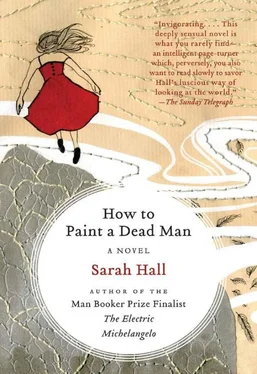Sarah Hall - How to Paint a Dead Man
Здесь есть возможность читать онлайн «Sarah Hall - How to Paint a Dead Man» весь текст электронной книги совершенно бесплатно (целиком полную версию без сокращений). В некоторых случаях можно слушать аудио, скачать через торрент в формате fb2 и присутствует краткое содержание. Год выпуска: 2009, Издательство: Harper Perennial, Жанр: Современная проза, на английском языке. Описание произведения, (предисловие) а так же отзывы посетителей доступны на портале библиотеки ЛибКат.
- Название:How to Paint a Dead Man
- Автор:
- Издательство:Harper Perennial
- Жанр:
- Год:2009
- ISBN:нет данных
- Рейтинг книги:4 / 5. Голосов: 1
-
Избранное:Добавить в избранное
- Отзывы:
-
Ваша оценка:
- 80
- 1
- 2
- 3
- 4
- 5
How to Paint a Dead Man: краткое содержание, описание и аннотация
Предлагаем к чтению аннотацию, описание, краткое содержание или предисловие (зависит от того, что написал сам автор книги «How to Paint a Dead Man»). Если вы не нашли необходимую информацию о книге — напишите в комментариях, мы постараемся отыскать её.
, Sarah Hall, "one of the most significant and exciting of Britain's young novelists" (
), delivers "a maddeningly enticing read... an amazing feat of literary engineering" (
).
How to Paint a Dead Man — читать онлайн бесплатно полную книгу (весь текст) целиком
Ниже представлен текст книги, разбитый по страницам. Система сохранения места последней прочитанной страницы, позволяет с удобством читать онлайн бесплатно книгу «How to Paint a Dead Man», без необходимости каждый раз заново искать на чём Вы остановились. Поставьте закладку, и сможете в любой момент перейти на страницу, на которой закончили чтение.
Интервал:
Закладка:
It is played like a comedy, so familiar that I can step to the side and watch the performance. Giorgio puts out his finger. He is belligerent. He demands exactly the same amount of soft tobaccos each week, he says. He has his wits and would not forget to request such an essential. Then he snatches the list from Theresa’s hand and strikes each item off the inventory as he finds it present on the kitchen table while she stands defiant, her arms crossed. There are no cigarettes, she says. Then it is not accurately taken dictation, he protests. It is slovenly! It is sabotage! How dare he call her slovenly, she cries; she is a woman of high virtue and cleanliness. And so, stalemate. The old man tries another tactic. He has depended on cigarettes for fifty years, to work, he says, and he has a certain image to uphold. When visitors arrive they expect to see their artist stooped in his winter overcoat, with his decrepit iron spectacles, and an eternal cigarette in his hand. They must not be disappointed. Such are his weaker arguments.
Eventually the tyrant Theresa relinquishes. The carton is ingeniously camouflaged behind her apron. Giorgio smokes in the terrible silence. He grinds out the stubs with extravagant force. Later, to make her begin speaking to him again, he engages her on inappropriate topics of conversation, such as the propaganda-filled newspaper her husband reads, her son’s military service, the joys of the changing season, and her routing of the lizards. All she wishes to do is to proceed with her domestic duties in peace, if he pleases. He slinks away to the studio.
In autumn, the lizards all wear attractive green cowls. They take warmth from any warm surface, finding refuge from the bristles and the broom handle in the grooves of the shutters. Make room for me, little friends! Have mercy, Theresa, on such habitual creatures as us! Theresa and I are engaged in a masquerade-this is very obvious. The argument is not over cigarettes. There is occasional blood in my mouth from coughing. Theresa wishes for me to see the doctor. It is not a seasonal complaint, she insists. I suspect she has noticed the warnings they are currently printing on the packets and she is alarmed.
In the morning after listening to the wind kindling the daylight I listen to the radio. I enjoy new music and operatic. I remain interested in national events, the debates about divorce. The voices reporting are dyspeptic-the world can be a terribly bitter thing to swallow. We remain divided on many issues. There is still shame; until we are united it will never pass.
Many of the day’s tasks can be done accompanied by the sounds of the radio. Reading. These journal entries. Letters to the bank, to Antonio, or a reply to an inquiry. I have been listening while putting glass tunnels over the basil-the radio casing is set on the windowsill and the dials adjusted. Sometimes I hear words coming from the radio when it is switched off, but it is only Theresa scolding the lizards for defying gravity on the ceiling where her broom cannot reach, or scolding her elderly ward dozing in an armchair for his tendency to leave the rind of the cheese in the drawer belonging to the cutlery. When I am in the studio I listen to the sporting events.
Though I have not felt inclined to join the truffle dogs at daybreak in the woods, I have been to the school this week. I should note that I was deceived into teaching there and I am now hostage to it. The mistress of the establishment invited me to lecture her class one Thursday last spring, and when I arrived she sent me home saying too many of the children were absent with colds. The following week I came again and she sent me away again for another reason, which I have forgotten; perhaps it was a holiday. She insisted we should try once more. On the third week I arrived earlier than any pied piper and I taught drafting and anatomy. By then I was used to the walk into town and the children enjoyed the lesson and Signora Russo asked me to tutor on Thursdays. I tried once to cancel the teaching and she became very annoyed and said duty and social contribution were essential for those in professions such as mine. I should consider the inheritance of our country and I should guide its young minds in beneficial directions. The economic miracle is oblivious both to our school system and to the arts, she said. She knows something of my relationship to the old government I think, and that I taught at the Academy, and the reasons I have extracted myself. She is versed in the country’s history, as we all are, and has, no doubt, strong opinions. We have not had the opportunity to discuss this at length. I suspect, like much of the population here, she is Communist.
I do not begin the class until I have recited all the names of all the children to myself. They sit in alphabetical order, which is convenient. When they are concentrating they are very quiet and it is a briefly peaceful time for me. Their drawings are wonderful. Children have no conscious knowledge of talent until informed of it by adults and they will suffer no intimidation until then. Sometimes the mothers come to the school gates to collect their children. They look at the images and ask why they have sketched the root of a tree or a small stone, rather than painting family portraits and little Davids, and I say to them, in this class it is pertinent to select such material, and I send them away.
There is a young girl in the class who has a congenital disease of the eyes. Her spectacles have a prescription even stronger than mine, and they pinch red marks on to the bridge of her nose. She finds it difficult to read. It is anticipated that by adulthood she will be blind, but she does not seem to be afraid. Her left eye is the worst, wasted to half the size of the right through its white aspect, with the lid often closing of its own accord.
We will never truly realise what blessings we receive along with our losses. Annette has a gift for discovering invisible things. If positioned in front of flowers she can detect borders and colours very well. She makes compartments and then fuses forms back together. She is a true Impressionist. Her natural medium is watercolour. I find in her work the most observant understanding-it has taken me over sixty years to acquire such skill. It is as if she has been freed from the convention of what exists only to seek it out with more integrity. The children are not unkind to her. She will not waste a single visible day. What can we hope for but this? Annette’s white peonies at rest in a vase. The white scent ends where the white page begins.
Peter has written to me again asking about the substance of shadows. A shadow can be one of two themes for a whole year in the Academy. He tells me he has been painting along the north-east coast where he is visiting his sick father and it is very cold. Peter imagines the rocks on the beaches have personalities. There is character in their detail, he says. Something peers out at him from within their forms. He wears gloves to paint. When the tide comes in he can hardly bend his fingers and wonders if the damp English air will one day give his joints arthritis. I should inform him that when he reaches my age it is certain to arrive regardless of the patriotism of the weathers.
Again his letter searches for clues. He has found a copy of La Voce in the university bookshop and he quotes Soffici: ‘It is through still-life that one can establish the true essence of what painting is all about.’ My friend, Ardengo Soffici, who I have not thought about for such a long time! I imagine Peter reaching out his cold hands. He reaches so much further than those who might more easily come here, to this hill, to this realm of discussion-those who catch trains from the capital, those who come to ask about my bottles and those who telephone Antonio at the agency in Bologna to ask about my health. From the distance of another country, from an old magazine with deep folds, which has no doubt been passed between many hands, his curiosity arrives.
Читать дальшеИнтервал:
Закладка:
Похожие книги на «How to Paint a Dead Man»
Представляем Вашему вниманию похожие книги на «How to Paint a Dead Man» списком для выбора. Мы отобрали схожую по названию и смыслу литературу в надежде предоставить читателям больше вариантов отыскать новые, интересные, ещё непрочитанные произведения.
Обсуждение, отзывы о книге «How to Paint a Dead Man» и просто собственные мнения читателей. Оставьте ваши комментарии, напишите, что Вы думаете о произведении, его смысле или главных героях. Укажите что конкретно понравилось, а что нет, и почему Вы так считаете.












